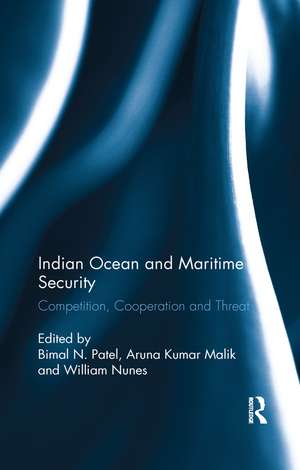Indian Ocean and Maritime Security: Competition, Cooperation and Threat
Editat de Bimal N. Patel, Aruna Kumar Malik, William Nunesen Limba Engleză Paperback – 14 iun 2019
- Highlights the competition between major Asian powers to control the ‘String of Pearls’ — a reference to the Chinese attempts at controlling the Indian Ocean periphery.
- Shows that cooperation amongst the major powers of the region could abate the threat of the potential of conflict becoming global and inviting external intervention.
- Discusses India’s Look-East policy and the deepening relation between India and the Association of Southeast Asian Nations (ASEAN).
- Argues for the need of Indian Ocean states and particularly the South Asian Association for Regional Cooperation (SAARC) members of the Indian Ocean Rim Association (IORA) to look afresh at their political and security issues and common interests.
- Suggests measures for evolving a robust mechanism of maintaining the Indian Ocean as a sustainable zone of commerce, energy, security and peace rather than threat.
| Toate formatele și edițiile | Preț | Express |
|---|---|---|
| Paperback (1) | 340.17 lei 6-8 săpt. | |
| Taylor & Francis – 14 iun 2019 | 340.17 lei 6-8 săpt. | |
| Hardback (1) | 1050.78 lei 6-8 săpt. | |
| Taylor & Francis – 31 oct 2016 | 1050.78 lei 6-8 săpt. |
Preț: 340.17 lei
Nou
Puncte Express: 510
Preț estimativ în valută:
65.09€ • 67.96$ • 53.87£
65.09€ • 67.96$ • 53.87£
Carte tipărită la comandă
Livrare economică 05-19 aprilie
Preluare comenzi: 021 569.72.76
Specificații
ISBN-13: 9780367177454
ISBN-10: 0367177455
Pagini: 178
Ilustrații: 4
Dimensiuni: 138 x 216 x 13 mm
Greutate: 0.23 kg
Ediția:1
Editura: Taylor & Francis
Colecția Routledge India
Locul publicării:Oxford, United Kingdom
ISBN-10: 0367177455
Pagini: 178
Ilustrații: 4
Dimensiuni: 138 x 216 x 13 mm
Greutate: 0.23 kg
Ediția:1
Editura: Taylor & Francis
Colecția Routledge India
Locul publicării:Oxford, United Kingdom
Public țintă
PostgraduateCuprins
Contents
Foreword
Preface
Acknowledgements
Notes on contributors
Introduction
PART I
The past, present and future of the Indian Ocean
1 Revisiting maritime security in the Indian Ocean: a note on current scenario
ARUNA KUMAR MALIK AND WILLIAM NUNES
2 China is pivot to the Indian Ocean Region: impacts and implications for India
K. ROBINSON
3 India’s role and responsibility as a major power in the Indian Ocean
PRIYAMBADA CHATURVEDI AND SUJOY ROUTH
4 India and China in the Indian Ocean Region: countervailing powers
ABHINAV GOYAL AND NIHARIKA
PART II
The Indian Ocean and India’s partners
5 Maritime security perspective of Sino–Indian relations in the Indian Ocean Region
SHREYA BANERJEE AND SHREYA CHATTERJEE
6 Maritime security concerns in the Indian Ocean: countering piracy trafficking and terrorism
HARSHVARDHAN SHARMA AND HIMANSHU SUBODH AWASTHI
7 Maritime security in the Indian Ocean: confronting non-traditional security threats with regional cooperation
NITIKA SRIVASTAVA
8 Indian Ocean: maritime security and the need of development
JAYANT GARG, HIMANSHU PANDEY AND BISHIKH MOHANTY
PART III
India’s influence and responsibilities in the Indian Ocean Region
9 Piracy off the coast of Somalia and maritime security
SHILPA NAIR
10 ‘Whale of the Ocean – India’
ANWESHA PATHAK AND ROHIT SHARMA
11 The China factor in Indo–Japan strategic relations
NISHTHA KAUSHIKI AND HILAL RAMZAN
12 Look-East policy: challenges and prospects for India and ASEAN security relations
D. RAMAKRISHNAN
Index
Foreword
Preface
Acknowledgements
Notes on contributors
Introduction
PART I
The past, present and future of the Indian Ocean
1 Revisiting maritime security in the Indian Ocean: a note on current scenario
ARUNA KUMAR MALIK AND WILLIAM NUNES
2 China is pivot to the Indian Ocean Region: impacts and implications for India
K. ROBINSON
3 India’s role and responsibility as a major power in the Indian Ocean
PRIYAMBADA CHATURVEDI AND SUJOY ROUTH
4 India and China in the Indian Ocean Region: countervailing powers
ABHINAV GOYAL AND NIHARIKA
PART II
The Indian Ocean and India’s partners
5 Maritime security perspective of Sino–Indian relations in the Indian Ocean Region
SHREYA BANERJEE AND SHREYA CHATTERJEE
6 Maritime security concerns in the Indian Ocean: countering piracy trafficking and terrorism
HARSHVARDHAN SHARMA AND HIMANSHU SUBODH AWASTHI
7 Maritime security in the Indian Ocean: confronting non-traditional security threats with regional cooperation
NITIKA SRIVASTAVA
8 Indian Ocean: maritime security and the need of development
JAYANT GARG, HIMANSHU PANDEY AND BISHIKH MOHANTY
PART III
India’s influence and responsibilities in the Indian Ocean Region
9 Piracy off the coast of Somalia and maritime security
SHILPA NAIR
10 ‘Whale of the Ocean – India’
ANWESHA PATHAK AND ROHIT SHARMA
11 The China factor in Indo–Japan strategic relations
NISHTHA KAUSHIKI AND HILAL RAMZAN
12 Look-East policy: challenges and prospects for India and ASEAN security relations
D. RAMAKRISHNAN
Index
Notă biografică
Bimal N. Patel is Director at Gujarat National Law University, Gandhinagar, India.
Aruna Kumar Malik is Assistant Professor of Political Science at Gujarat National Law University, Gandhinagar, India.
William Nunes is Associate Professor of Political Science at Gujarat National Law University, Gandhinagar, India.
Aruna Kumar Malik is Assistant Professor of Political Science at Gujarat National Law University, Gandhinagar, India.
William Nunes is Associate Professor of Political Science at Gujarat National Law University, Gandhinagar, India.
Descriere
This book provides a synoptic view of the Indian Ocean and maritime security in its contested waters. The volume highlights the competition between major Asian powers to control the Indian Ocean periphery; shows that cooperation amongst the major regional powers could abate the threat of the potential of conflict becoming global and inviting external intervention; and discusses India’s Look East policy and the deepening relation between India and ASEAN. It argues for the need for Indian Ocean states and particularly SAARC members of the Indian Ocean Rim Association to look afresh at their political and security issues and common interests. It also suggests measures for evolving a robust mechanism of maintaining the Indian Ocean as a sustainable zone of commerce, energy, security and peace rather than threat.
